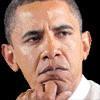Obama criticizes finance mentality
Bloomberg

refid:11888793 ilişkili resim dosyası
U.S. President Barack Obama offered stern words for Wall Street and a prediction of 10 percent U.S. unemployment even as he said the "engines" of an economic recovery have begun to turn."Wall Street seems to maybe have a shorter memory about how close we were to the abyss than I would have expected," Obama said, referring to criticism of the government’s growing role in the economy and markets.
Obama, in an interview with Bloomberg News on the eve of the release of his plan to revamp financial-market regulation, voiced confidence the economy would recover soon, while warning that robust growth was needed if the U.S. is to rein in its budget deficit without raising taxes on most Americans.
"You’re starting to see the engines of the economy turn," Obama said. Still, he said, "It’s going to take a long time" for a full-fledged recovery as households work off the debt accumulated during the real estate boom.
The jobless rate will continue to climb from its current 25-year high of 9.4 percent as employers are slow to take on new workers, the president said. "Jobs are a lagging indicator," he said, while adding that he didn’t have "a crystal ball" to predict when unemployment will start to decline.
Praising Bernanke
Obama, 47, gave high marks to Federal Reserve Chairman Ben S. Bernanke for his role in fighting the financial crisis.
Bernanke "has done an extraordinary job under extraordinary circumstances," the president said during the interview. He declined to say whether he would nominate Bernanke, 55, for another four-year term when his tenure runs out in January.
Ahead of Wednesday’s announcement, Obama pledged to make the derivatives market, which he called a system of "enormous risk," more transparent. He also said it is important for the U.S. to maintain fiscal discipline to ensure investors in China and around the world keep buying U.S. government debt.
"The No. 1 risk of the next crisis would be that the foreign lenders take a look at this situation and decide it’s too risky," said Peter G. Peterson, senior chairman of Blackstone Group International.
While expressing confidence in the long-term prospects for the economy, the president stressed the necessity of making tough reforms, including overhauling the health-care system, to generate the growth needed to reduce the budget deficit. He left open the possibility he would have to raise taxes on most Americans to decrease the deficit if growth were too weak. He also indicated he might tax the most-expensive employer-provided benefits to help pay for his health-care revamp. Both would reverse pledges he made during the campaign.
"If we are growing at a robust rate, then we can pay for the government that we need without having to raise taxes," Obama said. "If we’ve got anemic growth, if we don’t have a strategy for recovery without bubbles, which is essentially what we’ve had over the last couple of recovery cycles, then we’re going to continue to have problems."
The president has repeatedly said he would keep his presidential campaign pledge to cut taxes for 95 percent of working Americans while rolling back tax breaks for households making more than $250,000 a year.
During the campaign, Obama opposed taxing employer-provided health-care benefits, a proposal gaining traction among Senate Democrats to pay for a $1 trillion health-care plan. He said he preferred other means of funding the legislation, including reducing itemized deductions for the wealthiest Americans and focusing on cutting health-care costs.
Still, he said, "Congress is having a vigorous debate on the Hill, and I don’t want to predetermine the best way to do this." "I’ve already put forward what I think is the best way, but let me see what comes out of the Hill," Obama said. Only five months into a presidency that inherited the worst financial meltdown since the 1930s, Obama’s self-described "extraordinary" actions to stem the crisis have reached a critical juncture. He will now be tested less on his crisis-management skills and more on the policies that have extended the government’s reach into private industry.
Obama is assuming ownership of his bank-bailout plan, $787 billion economic-stimulus package, auto-industry restructuring and proposals to revise financial-market regulations.
He is also navigating new terrain as a steward of some of the best-known corporations, from General Motors to Citigroup, asserting the kind of control unseen since Harry Truman tried to force action on the steel industry in 1952.
















